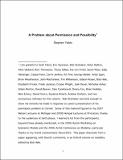A Problem about Permission and Possibility
Author(s)
Yablo, Stephen
Downloadpermposs.eganvolume.pdf (353.9Kb)
OPEN_ACCESS_POLICY
Open Access Policy
Creative Commons Attribution-Noncommercial-Share Alike
Terms of use
Metadata
Show full item recordAbstract
This chapter explores the prospects for a unified theory of deontic and (socalled) epistemic modality. A theory of deontic modality needs to solve the puzzles raised by David Lewis in 'A Puzzle About Permission'. In particular, it needs to say what the effect is of making something permissible, and what consequences a permission has in terms of what else is thereby permitted. It is argued that when p is made permissible, then a world w is still impermissible if, antecedently, w was impermissible for a reason not implying p. This model is extended to (so-called) epistemic modality. What should happen to the conversational context when it is accepted that it might be that p? The chapter suggests that three things happen. Most obviously, the common ground of the conversation now includes at least one world where p. Further, the common ground now includes worlds that were previously only ruled out for reasons that entailed ~p. Finally, once it is accepted that it might be that p, this cancels any assertion that ~p, even one that has not been explicitly made in this conversation.
Date issued
2011-06Department
Massachusetts Institute of Technology. Department of Linguistics and PhilosophyJournal
Epistemic Modality
Publisher
Oxford University Press (OUP)
Citation
Yablo, Stephen. “A Problem About Permission and Possibility.” Epistemic Modality (June 2011): 270–294 © 2011 The Author
Version: Author's final manuscript
ISBN
9780199591596